Fleurs du Mal Magazine


Or see the index
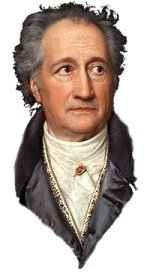
Johann Wolfgang von Goethe
(1749-1832)
Den Originalen
Ein Quidam sagt: »Ich bin von keiner Schule;
Kein Meister lebt, mit dem ich buhle;
Auch bin ich weit davon entfernt,
Daß ich von Toten was gelernt.«
Das heißt, wenn ich ihn recht verstand:
»Ich bin ein Narr auf eigne Hand.«
Johann Wolfgang von Goethe poetry
fleursdumal.nl magazine
More in: Archive G-H, Goethe, Johann Wolfgang von
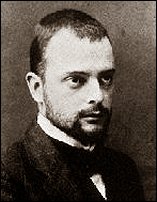
Paul Klee
(1879-1940)
Wasser, darauf Wellen
Wasser
darauf Wellen,
darauf ein Boot,
darauf ein Weib,
darauf ein Mann.
Spruchgedicht von Paul Klee, 1906
fleursdumal.nl magazine
More in: Archive K-L, Expressionism, Klee, Paul
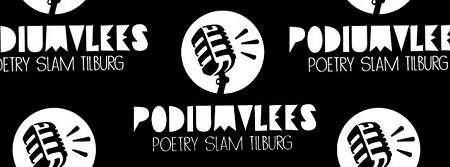
Laatste voorronde Podiumvlees Poetry Slam
Op zondagmiddag 7 juni aanstaande beleeft de Tilburgse Poetry Slam Podiumvlees haar vierde en laatste voorronde. Tijdens deze Poetry Slam zullen bekende en minder bekende (slam)dichters in drie rondes de poëtische strijd met elkaar aangaan. Op het spel staat een plaats in de Tilburgse Stedelijke Finale, die in september 2015 gehouden wordt. De Poetry Slam vindt op zondag 7 juni plaats in De Hall of Fame, Burgemeester Brokxlaan 6 in Tilburg. Aanvang 15.00 uur, toegang is gratis.
In deze editie van Podiumvlees gaan Joris Brussel, Simon Mulder, Kevin Amse, Jolies Heij en Bram Coppens de strijd met elkaar aan om de laatste plaats in de Stedelijke Finale. Zij worden beoordeeld door zowel een vakjury als een publieksjury. Tot nu toe hebben Yannick Moyson, Glenn Markesteyn en Von Solo zich geplaatst voor de Stedelijke finale. De winnaar van de Stedelijke Finale wint een ticket voor het Nederlands Kampioenschap Poetry Slam 2016 in Utrecht.
Podiumvlees is een initiatief van de Tilburgse slamdichters Martin Beversluis en Daan Taks. Zij zijn altijd op zoek naar nieuwe deelnemers. Wie meer informatie wil, kan op facebook terecht: www.facebook.com/podiumvlees
fleursdumal.nl magazine
More in: #More Poetry Archives, Art & Literature News, Poetry Slam, THEATRE
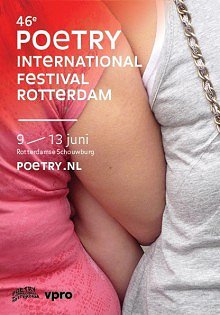 Reasons to be cheerful: van 9 tot en met 13 juni presenteert Poetry International Rotterdam voor de 46ste keer de meest toonaangevende poëzie van eigenzinnige en ontregelende grootmeesters naast die van jonge, originele dichterstalenten van overal ter wereld. Onder hen de Bask Harkaitz Cano, de Aboriginal Lionel Fogarty, Togara Muzanenhamo uit Zimbabwe, de Russen Philip Nikolayev en Lev Rubinstein, Kenneth Goldsmith uit de VS, Yanko González uit Chili, Justyna Bargielska uit Polen, de Duitsers Durs Grünbein, Marion Poschmann en Barbara Köhler, de Engelse Jen Hadfield, Pierre Alferi uit Frankrijk, de Noor Nils Christian Moe-Repstad, Guo Jinniu uit China, Peter Verhelst en Els Moors uit Vlaanderen en Hester Knibbe en Tonnus Oosterhoff uit eigen land. Negentien ‘Reasons to be cheerful!’
Reasons to be cheerful: van 9 tot en met 13 juni presenteert Poetry International Rotterdam voor de 46ste keer de meest toonaangevende poëzie van eigenzinnige en ontregelende grootmeesters naast die van jonge, originele dichterstalenten van overal ter wereld. Onder hen de Bask Harkaitz Cano, de Aboriginal Lionel Fogarty, Togara Muzanenhamo uit Zimbabwe, de Russen Philip Nikolayev en Lev Rubinstein, Kenneth Goldsmith uit de VS, Yanko González uit Chili, Justyna Bargielska uit Polen, de Duitsers Durs Grünbein, Marion Poschmann en Barbara Köhler, de Engelse Jen Hadfield, Pierre Alferi uit Frankrijk, de Noor Nils Christian Moe-Repstad, Guo Jinniu uit China, Peter Verhelst en Els Moors uit Vlaanderen en Hester Knibbe en Tonnus Oosterhoff uit eigen land. Negentien ‘Reasons to be cheerful!’
9 – 13 juni 2015 / Rotterdamse Schouwburg
46e Poetry International Festival Rotterdam
De voordrachten van de festivaldichters vormen de harde kern van het festival. Speciale programma’s brengen daarnaast vooraanstaande dichters, bijzondere poëzie en opvallende fenomenen in beeld. Zoals de dichters rond het Rotterdamse Gard Sivik en de Amsterdamse tegenhanger Barbarber die eind jaren vijftig relativering en humor de poëzie binnen brachten. Of professor Zeman uit Exeter, die de werking van poëzie in het brein onderzoekt en zal illustreren. Maakt poëzie lezen u gelukkig? Kenneth Goldsmith houdt geheel in lijn met de titel van zijn boek Uncreative Writing een bevlogen pleidooi voor hergebruik van taal. Het beste Nederlandstalige poëziedebuut van het jaar wordt voor de 26ste keer bekroond met de C. Buddingh’-prijs en de beste poëzievertaler naar het Duits wordt gehuldigd met de tweejaarlijkse Brockway Prize. Zoals altijd heeft het festival ook verder veel aandacht voor de poëzievertaling met programma’s als de Vertalersslam, Het Juiste Woord en het poëzievertaalproject Met Andere Woorden. Om het overzicht te bewaren maakt het Poëziecafé u dagelijks ontspannen wegwijs door het woud van festivaloptredens en programma’s.
Kunst en film: Voorafgaand aan het festival opent op zondag 7 juni de vierde language & ART Gallery Tour, de tocht langs meer dan vijftien Rotterdamse galeries met beeldend werk van kunstenaars voor wie de taal, het woord en de poëzie inspiratiebron is of direct deel uit maakt van hun opvallende werk. In de Kunsthal ziet u dit jaar werk van alle kunstenaars die elders in de tour exposeren. Op maandag 8 juni staat Poetry on / as Film op het programma met onder meer documentaires over Rogi Wieg, Nobelprijswinnares Hertha Müller en nog veel meer.
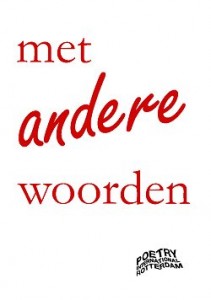 Masterclasses, Craft Talks, VPRO Poetry Academy: Het festival is er niet alleen om te luisteren en te ervaren, maar zeker ook om te doen. Tijdens de masterclasses helpen festivaldichters je verder met tips en tricks voor het lezen en voor het schrijven van poëzie. In de Craft Talks gaan festivaldichters in een half uur tijd dieper in op een bepaalde vorm of een zeker aspect van poëzie. Tijdens de VPRO Poetry Academy neemt Wim Brands u zelfs een volle middag mee op een leerzame reis door de wereld van de poëzie.
Masterclasses, Craft Talks, VPRO Poetry Academy: Het festival is er niet alleen om te luisteren en te ervaren, maar zeker ook om te doen. Tijdens de masterclasses helpen festivaldichters je verder met tips en tricks voor het lezen en voor het schrijven van poëzie. In de Craft Talks gaan festivaldichters in een half uur tijd dieper in op een bepaalde vorm of een zeker aspect van poëzie. Tijdens de VPRO Poetry Academy neemt Wim Brands u zelfs een volle middag mee op een leerzame reis door de wereld van de poëzie.
Festivalbrochure en -App: Uitgebreide informatie over de vele festivaldichters en -programma’s staat binnenkort op deze website. Op 5 mei verschijnt de festivalbrochure als bijlage in de VPRO gids. Geen abonnee, bestel de bijlage dan nu via deze link. Medio mei staat de festival-app online. Meldt u nu alvast aan, dan ontvangt u een reminder zodra de app beschikbaar is.
En op zoek naar een overnachting tijdens het festival? Waarom slaapt u niet eens bij een Rotterdamse dichter thuis. Kijk snel op Wake Up in Poetry.
• Wake Up bij Rotterdamse dichters
• Bekijk de festivalbrochure online
• Download de festival-App
# kijk verder op de website van Poetry International
fleursdumal.nl magazine
More in: #More Poetry Archives, Art & Literature News, MODERN POETRY, Poetry International
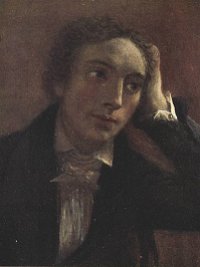
John Keats
(1795-1821)
To Mrs Reynolds’s Cat
Cat! who hast passed thy grand climacteric,
How many mice and rats hast in thy days
Destroyed? How many tit-bits stolen? Gaze
With those bright languid segments green, and prick
Those velvet ears – but prithee do not stick
Thy latent talons in me, and up-raise
Thy gentle mew, and tell me all thy frays
Of fish and mice, and rats and tender chick.
Nay, look not down, nor lick thy dainty wrists –
For all thy wheezy asthma, and for all
Thy tail’s tip is nicked off, and though the fists
Of many a maid have given thee many a maul,
Still is that fur as soft as when the lists
In youth thou enteredst on glass-bottled wall.
John Keats poetry
fleursdumal.nl magazine
More in: Archive K-L, Keats, John
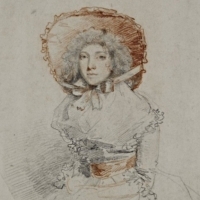
Mary Robinson
(1757?-1800)
All Alone
I
Ah! wherefore by the Church-yard side,
Poor little LORN ONE, dost thou stray?
Thy wavy locks but thinly hide
The tears that dim thy blue-eye’s ray;
And wherefore dost thou sigh, and moan,
And weep, that thou art left alone?
II
Thou art not left alone, poor boy,
The Trav’ller stops to hear thy tale;
No heart, so hard, would thee annoy!
For tho’ thy mother’s cheek is pale
And withers under yon grave stone,
Thou art not, Urchin, left alone.
III
I know thee well ! thy yellow hair
In silky waves I oft have seen;
Thy dimpled face, so fresh and fair,
Thy roguish smile, thy playful mien
Were all to me, poor Orphan, known,
Ere Fate had left thee–all alone!
IV
Thy russet coat is scant, and torn,
Thy cheek is now grown deathly pale!
Thy eyes are dim, thy looks forlorn,
And bare thy bosom meets the gale;
And oft I hear thee deeply groan,
That thou, poor boy, art left alone.
V
Thy naked feet are wounded sore
With thorns, that cross thy daily road;
The winter winds around thee roar,
The church-yard is thy bleak abode;
Thy pillow now, a cold grave stone–
And there thou lov’st to grieve–alone!
VI
The rain has drench’d thee, all night long;
The nipping frost thy bosom froze;
And still, the yewtree-shades among,
I heard thee sigh thy artless woes;
I heard thee, till the day-star shone
In darkness weep–and weep alone!
VII
Oft have I seen thee, little boy,
Upon thy lovely mother’s knee;
For when she liv’d–thou wert her joy,
Though now a mourner thou must be!
For she lies low, where yon grave-stone
Proclaims, that thou art left alone.
VIII
Weep, weep no more; on yonder hill
The village bells are ringing, gay;
The merry reed, and brawling rill
Call thee to rustic sports away.
Then wherefore weep, and sigh, and moan,
A truant from the throng–alone?
IX
“I cannot the green hill ascend,
“I cannot pace the upland mead;
“I cannot in the vale attend,
“To hear the merry-sounding reed:
“For all is still, beneath yon stone,
“Where my poor mother’s left alone!
X
“I cannot gather gaudy flowers
“To dress the scene of revels loud–
“I cannot pass the ev’ning hours
“Among the noisy village croud–
“For, all in darkness, and alone
“My mother sleeps, beneath yon stone.
XI
“See how the stars begin to gleam
“The sheep-dog barks, ’tis time to go;–
“The night-fly hums, the moonlight beam
“Peeps through the yew-tree’s shadowy row–
“It falls upon the white grave-stone,
“Where my dear mother sleeps alone.–
XII
“O stay me not, for I must go
“The upland path in haste to tread;
“For there the pale primroses grow
“They grow to dress my mother’s bed.–
“They must, ere peep of day, be strown,
“Where she lies mould’ring all alone.
XIII
“My father o’er the stormy sea
“To distant lands was borne away,
“And still my mother stay’d with me
“And wept by night and toil’d by day.
“And shall I ever quit the stone
“Where she is, left, to sleep alone.
XIV
“My father died; and still I found
“My mother fond and kind to me;
“I felt her breast with rapture bound
“When first I prattled on her knee–
“And then she blest my infant tone
“And little thought of yon grave-stone.
XV
“No more her gentle voice I hear,
“No more her smile of fondness see;
“Then wonder not I shed the tear
“She would have DIED, to follow me!
“And yet she sleeps beneath yon stone
“And I STILL LIVE–to weep alone.
XVI
“The playful kid, she lov’d so well
“From yon high clift was seen to fall;
“I heard, afar, his tink’ling bell–
“Which seem’d in vain for aid to call–
“I heard the harmless suff’rer moan,
“And grieved that he was left alone.
XVII
“Our faithful dog grew mad, and died,
“The lightning smote our cottage low–
“We had no resting-place beside
“And knew not whither we should go,–
“For we were poor,–and hearts of stone
“Will never throb at mis’ry’s groan.
XVIII
“My mother still surviv’d for me,
“She led me to the mountain’s brow,
“She watch’d me, while at yonder tree
“I sat, and wove the ozier bough;
“And oft she cried, “fear not, MINE OWN!
“Thou shalt not, BOY, be left ALONE.”
IXX
“The blast blew strong, the torrent rose
“And bore our shatter’d cot away;
“And, where the clear brook swiftly flows–
“Upon the turf at dawn of day,
“When bright the sun’s full lustre shone,
“I wander’d, FRIENDLESS — and ALONE!”
XX
Thou art not, boy, for I have seen
Thy tiny footsteps print the dew,
And while the morning sky serene
Spread o’er the hill a yellow hue,
I heard thy sad and plaintive moan,
Beside the cold sepulchral stone.
XXI
And when the summer noontide hours
With scorching rays the landscape spread,
I mark’d thee, weaving fragrant flow’rs
To deck thy mother’s silent bed!
Nor, at the church-yard’s simple stone,
Wert, thou, poor Urchin, left alone.
XXII
I follow’d thee, along the dale
And up the woodland’s shad’wy way:
I heard thee tell thy mournful tale
As slowly sunk the star of day:
Nor, when its twinkling light had flown,
Wert thou a wand’rer, all alone.
XXIII
“O! yes, I was! and still shall be
“A wand’rer, mourning and forlorn;
“For what is all the world to me–
“What are the dews and buds of morn?
“Since she, who left me sad, alone
“In darkness sleeps, beneath yon stone!
XXIV
“No brother’s tear shall fall for me,
“For I no brother ever knew;
“No friend shall weep my destiny
“For friends are scarce, and tears are few;
“None do I see, save on this stone
“Where I will stay, and weep alone!
XXV
“My Father never will return,
“He rests beneath the sea-green wave;
“I have no kindred left, to mourn
“When I am hid in yonder grave!
“Not one ! to dress with flow’rs the stone;–
“Then–surely , I AM LEFT ALONE!”
Mary Darby Robinson poetry
fleursdumal.nl magazine
More in: Archive Q-R, CLASSIC POETRY
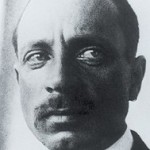
Rainer Maria Rilke
(1875-1926)
Wir haben eine Erscheinung
Wir haben eine Erscheinung. Sie steht in den Zimmern, und auf den leeren Plätzen steht sie um Mitternacht, und wenn es Morgen wird, so wird sie deutlicher mit dem Tag, und wir sehen die Häuser durch ihre durchscheinende Gestalt. Ein Revenant ist davon abhängig, wie viele ihn wahrnehmen. Diesen gewahren alle: er ist aus allen Gräbern gestiegen. Alle gewahren ihn. Aber wer erkennt ihn?
Nein. Ihr sollt nicht bekannt tun mit ihm. Ihr sollt ihm nicht das Zubehör und die Zunamen früherer Kriege anhängen, denn ob es gleich ein Krieg ist, so kennt ihr ihn doch nicht. Da man euch Bilder von Greco zeigte, so gabt ihr zu, daß da ein Erleben sei, das ihr nicht kanntet. Und wenn dieser Krieg ein Gesicht hat, so sollt ihr es ansehn wie das Gesicht Amenophis des Vierten, das vorher nicht da war. Ihr sollt davor stehen, wie neulich vor der Tatsache, daß in ein paar Pferden, bisher unangerufen, eine Gegenwart des bestimmtesten Geistes wohnt; ihr sollt als die, die ihr jetzt seid, den leidenschaftlichen Umgang des Todes hinnehmen und seine Vertraulichkeit erwidern; denn was wißt ihr von seiner Liebe zu euch?
Wir haben eine Erscheinung, – und es hat sie mancher angerufen; sie aber weicht nicht und schreitet durch unsere Wände und steht nicht Rede. Weil ihr tut, als kenntet ihr sie. Erhebt eure Augen und kennt sie nicht; schafft ein Hohles um sie mit der Frage eurer Blicke; hungert sie aus mit Nichtkennen! Und plötzlich, in der Angst nicht zu sein, wird euch das Ungeheuere seinen Namen schrein und wegsinken.
Rainer Maria Rilke poetry
fleursdumal.nl magazine
More in: Archive Q-R, Rilke, Rainer Maria
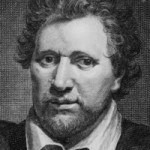
Ben Jonson
(1572-1637)
My Picture Left in Scotland
I now thinke, Love is rather deafe, than blind,
For else it could not be,
That she,
Whom I adore so much, should so slight me,
And cast my love behind:
I’m sure my language to her, was as sweet,
And every close did meet
In sentence, of as subtile feet
As hath the youngest Hee,
That sits in shadow of Apollo’s tree.
Oh, but my conscious feares,
That flie my thoughts betweene,
Tell me that she hath seene
My hundreds of gray haires,
Told seven and fortie yeares,
Read so much wast, as she cannot imbrace
My mountaine belly and my rockie face,
And all these through her eyes, have stopt her eares.
Ben Jonson poetry
fleursdumal.nl magazine
More in: Archive I-J, CLASSIC POETRY
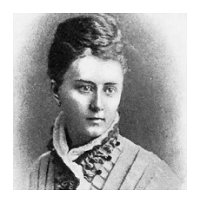
Isabella Valancy Crawford
(1846–1887)
His Sweetheart
Sylvia’s lattices were dark
Roses made them narrow.
In the dawn there came a Spark,
Armd with an arrow:
Blithe he burst by dewy spray,
Winged by bud and blossom,
All undaunted urged his way
Straight to Sylvia’s bosom.
‘Sylvia! Sylvia! Sylvia!’ he
Like a bee kept humming,
‘Wake, my sweeting; waken thee,
For thy Soldier’s coming!’
Sylvia sleeping in the dawn,
Dreams that Cupid’s trill is
Roses singing on the lawn,
Courting crested lilies.
Sylvia smiles and Sylvia sleeps,
Sylvia weeps and slumbers;
Cupid to her pink ear creeps,
Pipes his pretty numbers.
Sylvia dreams that bugles play,
Hears a martial drumming;
Sylvia springs to meet the day
With her Soldier coming.
Happy Sylvia, on thee wait
All the gracious graces!
Venus mild her cestus plait
Round thy lawns and laces!
Flora fling a flower most fair,
Hope a rainbow lend thee!
All the nymphs to Cupid dear
On this day befriend thee!
‘Sylvia! Sylvia! Sylvia!’ hear
How he keeps a-humming,
Laughing in her jewelled ear,
‘Sweet, thy Soldier’s coming!’
Isabella Valancy Crawford poetry
fleursdumal.nl magazine
More in: Archive C-D, CLASSIC POETRY
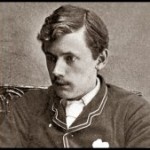
Ernest Dowson
(1867-1900)
Beata Solitudo
What land of Silence,
Where pale stars shine
On apple-blossom
And dew-drenched vine,
Is yours and mine?
The silent valley
That we will find,
Where all the voices
Of humankind
Are left behind.
There all forgetting,
Forgotten quite,
We will repose us,
With our delight
Hid out of sight.
The world forsaken,
And out of mind
Honour and labour,
We shall not find
The stars unkind.
And men shall travail,
And laugh and weep;
But we have vistas
Of gods asleep,
With dreams as deep.
A land of Silence,
Where pale stars shine
On apple-blossoms
And dew-drenched vine,
Be yours and mine!
Ernest Dowson poetry
fleursdumal.nl magazine
More in: Archive C-D, Dowson, Ernest
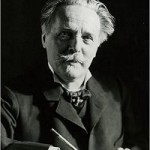
Karl May
(1842-1912)
Mein Liebchen
Wenn Sorge mich und Unmuth quälet,
Wenn mir’s an Moos im Beutel fehlet,
Wenn mich ein schwerer Kummer drückt,
Das Schicksal mich mit Pech beglückt:
Was ist es dann, wonach ich greife?
I nun! Die liebe Tabakspfeife!
Bei meinen Freuden, meinen Scherzen,
Beim Austausch gleichgesinnter Herzen,
In all’ den traulich frohen Stunden,
Die ich im Freundeskreis gefunden,
Bei meines Glück’s so seltner Reife
Ist stets um mich die liebe Pfeife.
Auf all’ den Reisen, die ich machte,
Wo die Natur mir freundlich lachte,
Auf all’ den einsam trauten Wegen,
Im Waldesgrün, wo ich gelegen,
In Feld und Flur, die ich durchstreife,
Begleitet mich die treue Pfeife.
Sie bleibt mir Braut durch’s ganze Leben;
Ja, sie in Adel zu erheben
Ist wohl ein Leichtes: Das Diplom
Schreibt sie sich selbst durch ihr Arom.
Sie heiße d’rum, ob man auch keife,
Von jetzt an: Edle von der Pfeife!
Karl May poetry
fleursdumal.nl magazine
More in: Archive M-N, Karl May
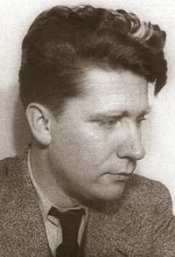
Hendrik Marsman
(1899-1940)
Maannacht
De maan breekt de wolken uiteen;
en stromende uit die wel breken
kolken en kreken, gletschers en meren
naar alle verten uiteen.
de aarde is klein en alleen,
een slingerend schip in het ruim,
dat zich stampend en schuin
overstag gaand in doodsangst
kampende boven houdt
op het kolkende water des donkers
onder het stormende schuim.
ik lig in het ruim naast een vrouw.
haar borsten rijzen en dalen;
zij slaapt, zij denkt nu alleen
in haar dromen aan het geluk;
hoe vredig haar ademhalen:
zij weet niets van de nood
van ons schip, zij hoort
de seinen niet gillen
noch het angstige fluiten
driemaal, als een signaal
van de dood.
gun mij nog twee uren slaap,
ik kán zo niet blijven waken.
– neem dan nu afscheid van haar,
misschien zult gij de morgen niet halen,
tenzij in een ander land.
ik schuif mijn hand in haar hand
– zie, even beven haar wimpers –
zo liggen wij naast elkaar
als tweelingen, sluimrende kindren.
zullen wij elkaar niet meer vinden
dan zij mij dood – of ik haar?
Hendrik Marsman poetry
fleursdumal.nl magazine
More in: Archive M-N, Marsman, Hendrik
Thank you for reading Fleurs du Mal - magazine for art & literature